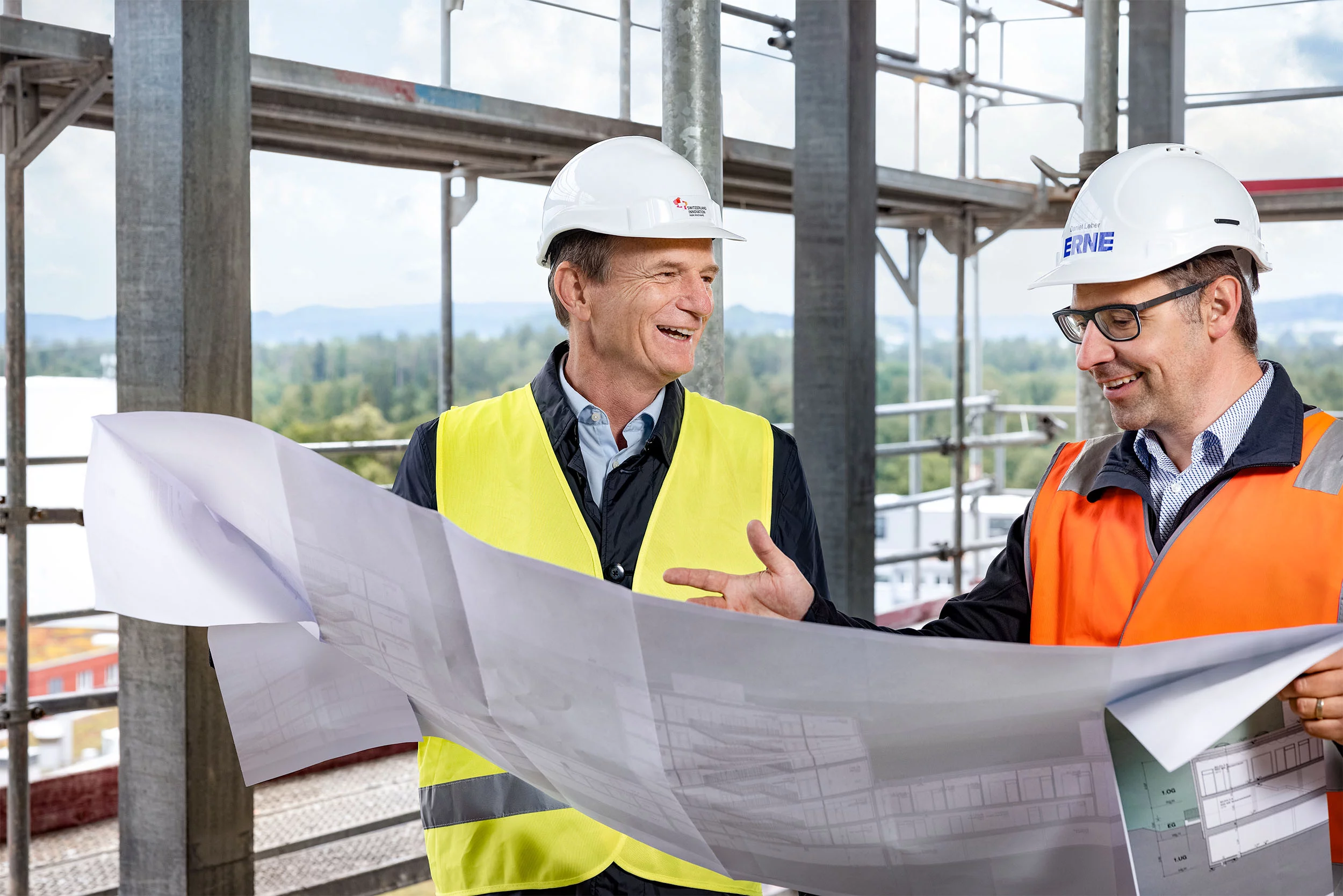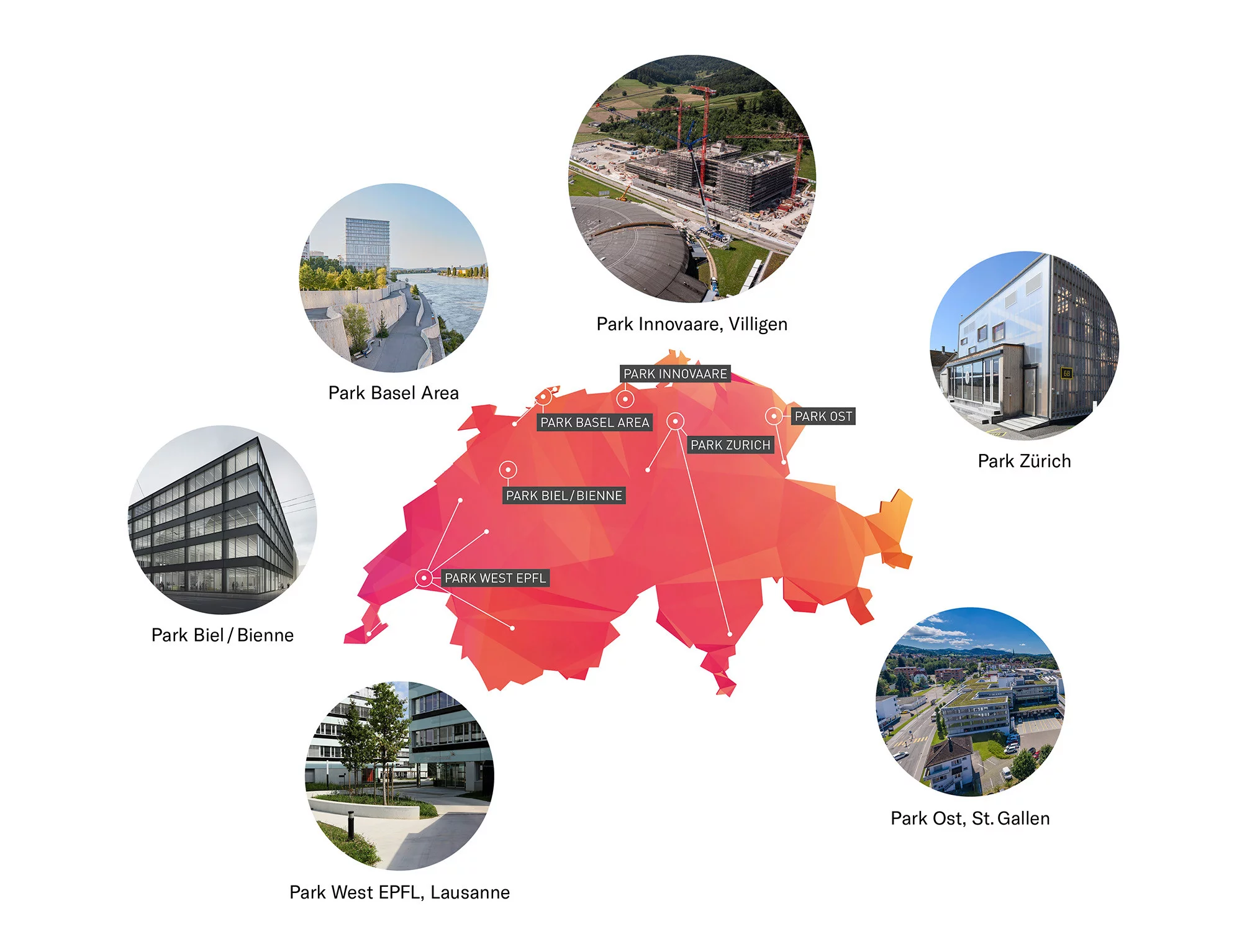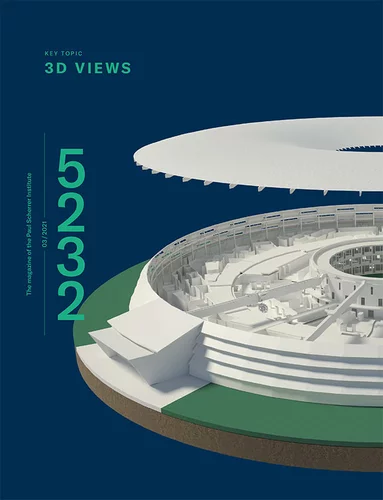Switzerland Innovation, a nationwide network of technology parks, continues to grow: Park Innovaare located next to PSI is flourishing as it pursues its mission to help cutting-edge Swiss research transition to concrete applications and profitable companies.
"We are looking at the future cleanroom facility, where researchers will work on particularly sensitive materials," says architect Daniel Leber, entering a massive hall built from reinforced concrete on the Park Innovaare construction site. The hall still looks more like an underground car park, but the project manager goes on to say that with a little imagination, one can easily picture scientists in protective suits tinkering with high-tech materials on the nanoscale. "Cleanroom cubicles will eventually be installed here," he explains. "Specialised filters will purify the air to minimise the amount of particles." This is essential for research and manufacturing processes such as those used for semiconductors or pharmaceuticals.
Leber is an architect with the Swiss construction company ERNE and overall project manager for the innovation campus Park Innovaare being built next to PSI. The expansion has been under construction since November 2019 and should be available by the end of 2023, offering around 23,000 square metres of floor space housing offices, laboratories and workshops.
Daniel Leber is proud to show the progress already made with the four buildings on the innovation campus. He describes the project as “a very inspirational undertaking”: "It involves many specialist applications, with a steady stream of structural engineering challenges." The X-ray facility, for example, has reinforced concrete walls 50 centimetres thick. In addition, an overhead crane is needed to install the extremely heavy X-ray machines. A high-tech ventilation system is required for some of the physics laboratories to regulate temperature at a constant 0.1 degrees Celsius. In the clean-room facility, concrete walls are isolated from the walls of adjacent buildings by a special separation layer made of nylon wire mesh. This prevents vibrations passing from one building to the next – critical protection for intricate nanoscale activities.
We’re looking for companies eager to take a genuine technological leap forward.
All aspects covered
Apart from the high-tech installations, all the basic amenities are in place as well, including a restaurant capable of serving up to 200 meals. This will provide a social hub where scientists and innovation pioneers from industry and academia will be able to discuss joint research projects over lunch. "Since its inception in 2015, Park Innovaare has become a meeting place for managers from innovative companies to get together with prominent scientists from PSI and other research institutes and universities," says Benno Rechsteiner, CEO of Park Innovaare. "We bring innovations to market, create new jobs and generate value added for the Canton of Aargau and the whole of Switzerland."
If required, larger industrial companies can even fit out entire floors of the expansion building to suit their individual needs, while small start-ups can rent fully equipped laboratories and offices for immediate use. All tenants can pay to use infrastructures such as cleanrooms, whose construction and maintenance would otherwise be far too costly.
Other facilities are of course available, if needed, on the other side of the street – at PSI itself. "Close proximity to PSI, with its large research facilities and standing in the international scientific community makes Park Innovaare a particularly attractive location," says Rechsteiner. "We’re looking for companies eager to take a genuine technological leap forward."
Waiting to move in
17 companies, some of them spin-offs from PSI, are already settled in Park Innovaare. Until the new buildings are ready, current tenants are housed in the deliveryLAB, a two-storey wooden pavilion on the western side, or on the PSI site itself. "We’re already excited about moving into the new innovation campus as soon as possible so that we can continue our growth story," says Michael Hennig, CEO and co-founder of leadXpro. The company has rented an entire floor in one of the new buildings.
LeadXpro specialises in the characterisation of membrane proteins – important interfaces and useful target structures for drug discovery. This PSI spin-off uses both the Swiss Light Source SLS and the X-ray free-electron laser SwissFEL to conduct its research. Other tenants in Park Innovaare include the technology transfer centre ANAXAM, which offers companies materials analytics using neutron and synchrotron radiation. Its services range from advice on measurements with tailor-made infrastructures for data analysis, through to the final report.
The close partnership between research and industry not only benefits the spin-offs themselves, but also PSI, as it enables inventions and technological developments to be brought to market sooner. "Close physical proximity allows rapid and straightforward communication – many issues can even be discussed at short notice over lunch," comments Jens Rehanek, CEO of Advanced Accelerator Technologies, a joint initiative of PSI and several industry partners. The company commercialises PSI’s know-how in the development of accelerator technologies and other scientific installations.
What’s the purpose of innovation parks?
"Switzerland leads the way in basic research," says Raphaël Tschanz, Deputy Director of the foundation Switzerland Innovation in Bern, the umbrella organisation for the national network of innovation campuses that includes Park Innovaare. "Unfortunately Switzerland is slipping behind when it comes to translating these research findings into concrete applications and products. There are not enough projects in the technology transfer stage and too little collaboration between industry and universities."
Back in 2012, the Swiss Federal Council decided to address this by creating the legal framework to establish a network of innovation parks. ETH Zurich and EPFL in Lausanne were the two main sites initially, and other sites could then apply to join. In addition to Park Innovaare, Park Biel and Park Basel Area have signed up. This year the Federal Council also gave the green light for a sixth site in Saint Gallen.
"Every site has a thematic focus," explains Tschanz, "in other words, each offers certain specialisations linked to the research competence of the various institutes, universities or companies in the region." The Basel Area, for example, is a leader in biotechnology and biomedicine. The key competences of Park Innovaare include accelerator technologies, advanced materials, human health and energy.
Swiss Romandie: a role model
Tschanz singles out Park Network West EPFL as a prime role model for the more recently established innovation parks. Its sites in Lausanne, Sion, Geneva, Neuchâtel and Fribourg cover all of Swiss Romandie, the French-speaking part of Switzerland. "Private industry has produced consistently high demand in this region," Tschanz notes. "Work has already started in Lausanne 20 years ago to actively encourage partnerships between industry and academic institutions."
The goal is to create a flourishing ecosystem that fosters a truly entrepreneurial spirit. Raphaël Tschanz is confident the new building in Villigen will accelerate this process even further – especially since the PSI will also be a tenant on the innovation campus. "There are only a few places in the world where so much know-how is as highly concentrated as it is at PSI." All types of company stand to benefit from it.
Text: Brigitte Osterath
Copyright
PSI provides image and/or video material free of charge for media coverage of the content of the above text. Use of this material for other purposes is not permitted. This also includes the transfer of the image and video material into databases as well as sale by third parties.



